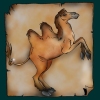Namnöversättning
| Tolkien (första förekomst) |
Åke Ohlmarks | Erik Andersson | Kamelen |
|---|---|---|---|
| orc (Prolog, kapitel 1: Angående hober) |
orch | ork | ork |
| Tolkiens översättningsguide | |||
| Orc. This is supposed to be the Common Speech name of these creatures at that time; it should therefore according to the system be translated into English, or the language of translation. It was translated 'goblin' in The Hobbit, except in one place; but this word, and other words of similar sense in other-European languages (as far as I know), are not really suitable. The orc in The Lord of the Rings and The Silmarillion, though of course partly made out of traditional features, is not really comparable in supposed origin, functions, and relation to the Elves. In any case orc seemed to me, and seems, in sound a good name for these creatures. It should be retained.
It should be spelt ork (so the Dutch translation) in a Germanic language, but I had used the spelling orc in so many places that I have hesitated to change it in the English text, though the adjective is necessarily spelt orkish. The Grey-elven form is orch, plural yrch. I originally took the word from Old English orc (Beowulf [line 112] orc-nass and the gloss orc = þyrs 'Ogre', heldeofol 'hell-devil'). This is supposed not to be connected with modern English orc, ork, a name applied to various sea-beasts of the dolphin order. |
|||
| Kommentar | |||
| Här är professorn så oerhört specifik att det bara är att foga sig och använda ork. (Ohlmarks knyckte helt fräckt det sindarinska ordet orch till sin översättning, och för att sopa detta under mattan så gav han sig på att också ändra sindarinskan. Där det står orch i originalet översatte Ohlmarks det alviska ordet till orc. Inte snyggt...) Senast uppdaterad: 2013-01-10 19:34:25 |
|||
| Tolkien | Åke Ohlmarks |
|---|---|
| orc | orch |
| Erik Andersson | Kamelen |
| ork | ork |
| Tolkiens översättningsguide | |
| Orc. This is supposed to be the Common Speech name of these creatures at that time; it should therefore according to the system be translated into English, or the language of translation. It was translated 'goblin' in The Hobbit, except in one place; but this word, and other words of similar sense in other-European languages (as far as I know), are not really suitable. The orc in The Lord of the Rings and The Silmarillion, though of course partly made out of traditional features, is not really comparable in supposed origin, functions, and relation to the Elves. In any case orc seemed to me, and seems, in sound a good name for these creatures. It should be retained.
It should be spelt ork (so the Dutch translation) in a Germanic language, but I had used the spelling orc in so many places that I have hesitated to change it in the English text, though the adjective is necessarily spelt orkish. The Grey-elven form is orch, plural yrch. I originally took the word from Old English orc (Beowulf [line 112] orc-nass and the gloss orc = þyrs 'Ogre', heldeofol 'hell-devil'). This is supposed not to be connected with modern English orc, ork, a name applied to various sea-beasts of the dolphin order. |
|
| Kommentar | |
| Här är professorn så oerhört specifik att det bara är att foga sig och använda ork. (Ohlmarks knyckte helt fräckt det sindarinska ordet orch till sin översättning, och för att sopa detta under mattan så gav han sig på att också ändra sindarinskan. Där det står orch i originalet översatte Ohlmarks det alviska ordet till orc. Inte snyggt...) Senast uppdaterad: 2013-01-10 19:34:25 |
|



